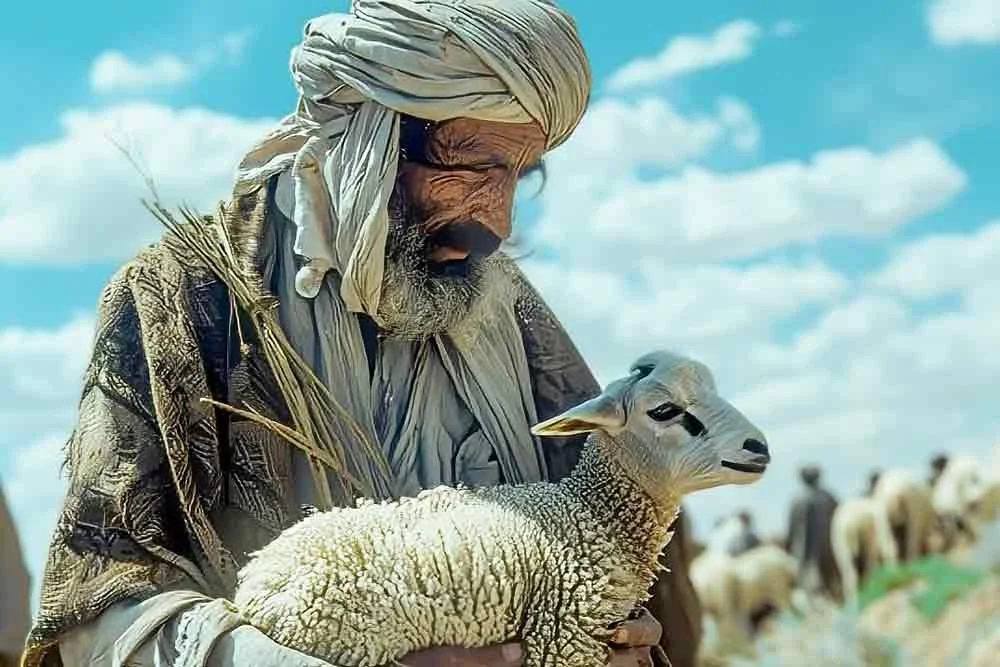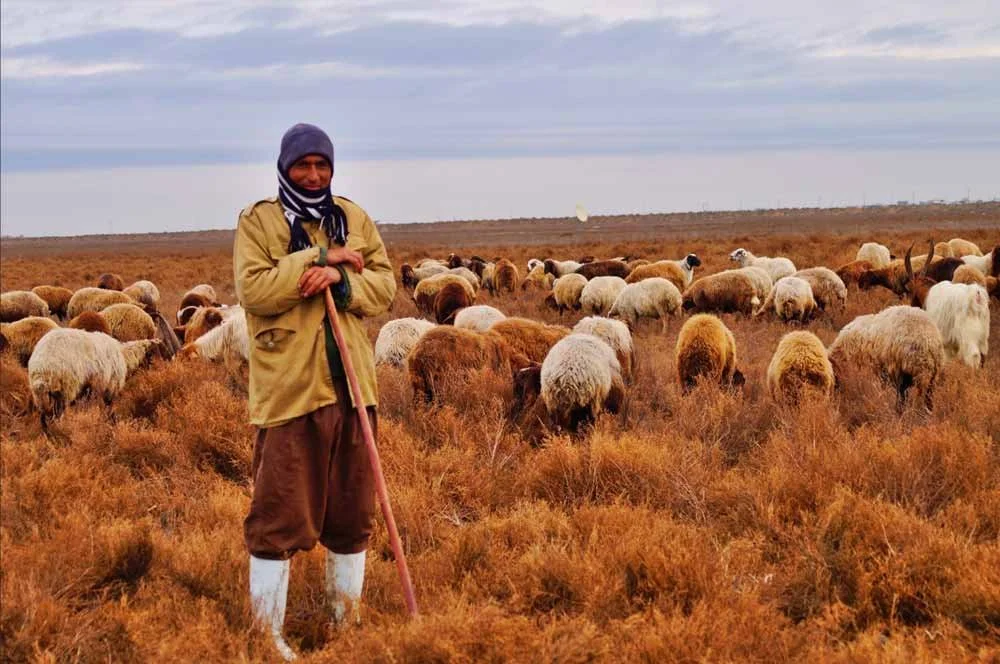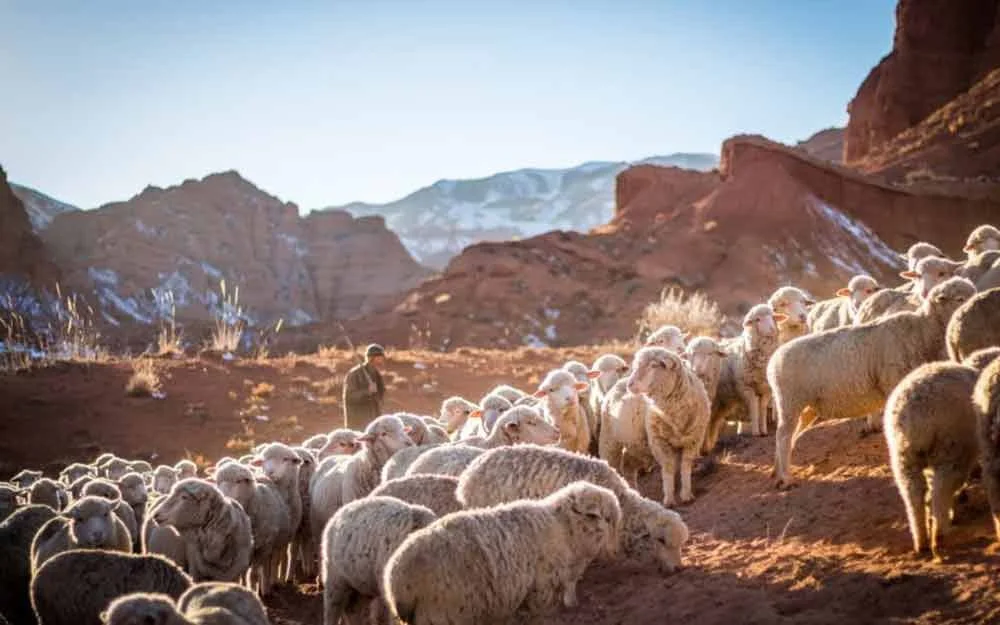PARABLE OF THE LOST SHEEP
• The Parable of the Lost Sheep
• A modern retelling of the Parable of the Lost Sheep
What is a parable? (Hint: Look in vocabulary list!)
How many sheep did the shepherd have at the beginning of the story?
What did the shepherd do when one sheep went missing?
What were the two biggest tasks for a shepherd caring for a flock of sheep?
What risks did the shepherd take when searching for the lost sheep?
Why might the shepherd, and not the sheep, be the main character in this parable?
What does the shepherd do after finding the lost sheep?
How does the parable help us think about things we have lost in our own lives?
Why might someone rewrite the story using children instead of sheep?
What is one thing the story can teach us about God?
• Read •
PARABLE OF THE LOST SHEEP
A Story That’s More Than It Seems
Jesus once told a story that might sound simple at first. It’s about a shepherd and some sheep.
Here’s how it goes:
Suppose one of you has a hundred sheep and one goes missing. Wouldn’t you leave the ninety-nine in the wilderness and go look for the one that’s lost? And when you find it, you put it on your shoulders and celebrate. Then you call your friends and neighbors and say, ‘Be happy with me! I’ve found my lost sheep!’
—Luke 15:3-6
You’ve probably heard this story before.
It’s often used to show how much God cares about each person, even those who wander away or mess up. But have you ever really stopped to think about the details?
What Did a Shepherd Really Do?
Back in ancient Israel, being a shepherd wasn’t just a walk in the park. Shepherds didn’t just stroll around with their flocks on sunny hillsides. It was hard work!
A shepherd had to protect the sheep from wild animals.
• Grey wolf
A shepherd also had to make sure they had food and water, and keep the flock together. And guess what? Sheep are not exactly the smartest animals. They get distracted, wander off, and can easily end up in dangerous places.
Shepherds didn’t always own the sheep. Sometimes they were just hired to take care of them. But either way, the job was important. Sheep were valuable. People used them for wool, food, and religious offerings. So losing even one sheep could mean big trouble.
The Risky Rescue
Now imagine this: you’ve got 100 sheep. That’s a big flock. But suddenly, you notice one is missing. What would you do?
• Syrian brown bear
The shepherd in Jesus’s story leaves the other 99—yes, leaves them right there in the wilderness—and goes after the one that’s lost.
That seems like a huge risk! What if the other 99 wander off too? What if a wild animal shows up?
• The golden jackal, also called the Asiatic, Oriental or common jackal. It is a carnivorous mammal.
What if someone steals them?
We don’t know if the shepherd left someone to watch the rest of the flock. The story doesn’t say. All we know is that the shepherd thought finding the one lost sheep was worth everything.
Who’s the Main Character?
Most people think this parable is about the sheep—that it represents a person who has sinned and then repents. That means they realize they’ve done something wrong and decide to do better.
But think about it again. The sheep doesn’t do much in the story. It doesn’t say sorry. It doesn’t try to come back. It just wanders off, like sheep do. It’s the shepherd who does all the work. The shepherd searches, finds the sheep, lifts it up, and throws a party.
So maybe this story is also about the shepherd—about someone who cares deeply and never gives up on what’s lost.
Digging Deeper
There’s more. Right after this story, the Bible says:
“There will be more joy in heaven over one sinner who repents than over ninety-nine good people who don’t need to repent.”
—Luke 15:7
That’s one reason people think the sheep represents someone who turns back to God. And that interpretation is true and powerful. But Jesus might also be nudging us to ask some hard questions.
For example: What have you lost?
Have you lost your courage? Your trust in someone? Your belief in yourself or in God? Everyone has lost something at some point.
And here’s another question: What would you do to get it back?
The shepherd risked everything to find the sheep.
Would you do the same to find what you’ve lost?
Sheep, Children, and New Ways to See
In a modern version of this parable, someone rewrote the story using children instead of sheep. Not because kids are silly like sheep—but because, like sheep, kids sometimes wander, get lost, or end up in trouble when they’re on their own.
In that retelling, the adult leaves the other children alone to go find the one who’s missing. That might sound scary. But it helps us notice something we usually skip over: the shepherd in the original story really did leave the 99 behind. That’s how much the lost one mattered.
Jesus wanted his listeners to really think. Maybe he wants us to think too.
What are we missing?
Who are we forgetting?
And how far are we willing to go to fix what’s broken?
Sometimes the smallest stories ask the biggest questions.
Ancient (adj.): Very old; from a long time ago.
Celebrate (v.): To show happiness about something with a party or special event.
Confidence (n.): Belief that you can do something well.
Courage (n.): The strength to do something even when it’s hard or scary.
Dangerous (adj.): Likely to cause harm or trouble.
Describes (v.): Tells what something is like.
Flock (n.): A group of animals, like sheep or birds, that stay together.
Interpretation (n.): A way of understanding or explaining something.
Missing (adj.): Gone or lost.
Nomadic (adj.): Moving from place to place instead of staying in one spot.
Parable (n.): A short story that teaches a lesson, often used by Jesus.
Protect (v.): To keep something safe from danger.
Repent (v.): To feel sorry for doing something wrong and try to do better.
Responsibility (n.): A job or duty to take care of something or someone.
Wilderness (n.): A wild, natural area with few or no people.
► COMPREHENSION QUESTIONS
— please answer with complete sentences
What is a parable? (Hint: Look in vocabulary list.)
How many sheep did the shepherd have at the beginning of the story?
What did the shepherd do when one sheep went missing?
What were the two biggest tasks for a shepherd caring for a flock of sheep?
What risks did the shepherd take when searching for the lost sheep?
Why might the shepherd, and not the sheep, be the main character in this parable?
What does the shepherd do after finding the lost sheep?
How does the parable help us think about things we have lost in our own lives?
Why might someone rewrite the story using children instead of sheep?
What is one thing the story can teach us about God?
► From EITHER/OR ► BOTH/AND
► FROM Right/Wrong ► Creative Combination
THESIS — Argue the case that it’s ridiculous to leave 99 sheep and go looking for 1 lost sheep.
ANT-THESIS — Argue the case that searching for 1 lost sheep is very important.
SYN-THESIS — Is there a way to bring these two perspectives together?

















